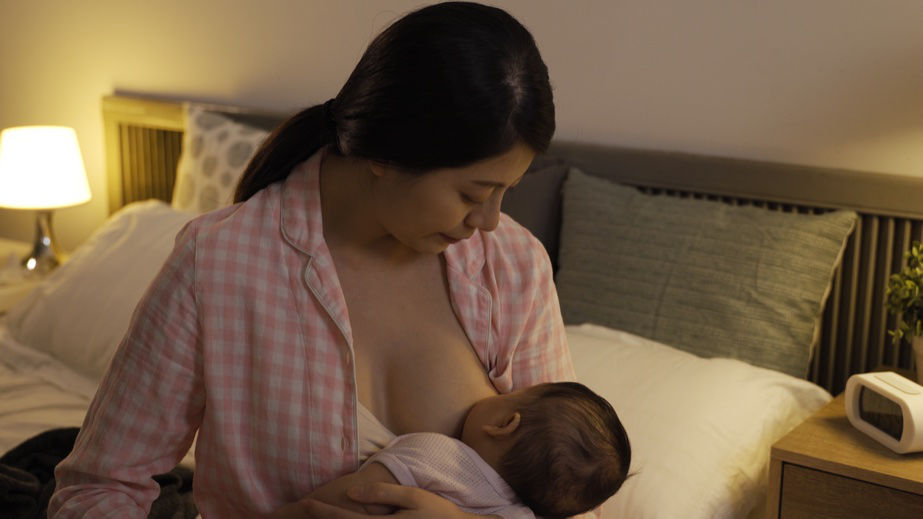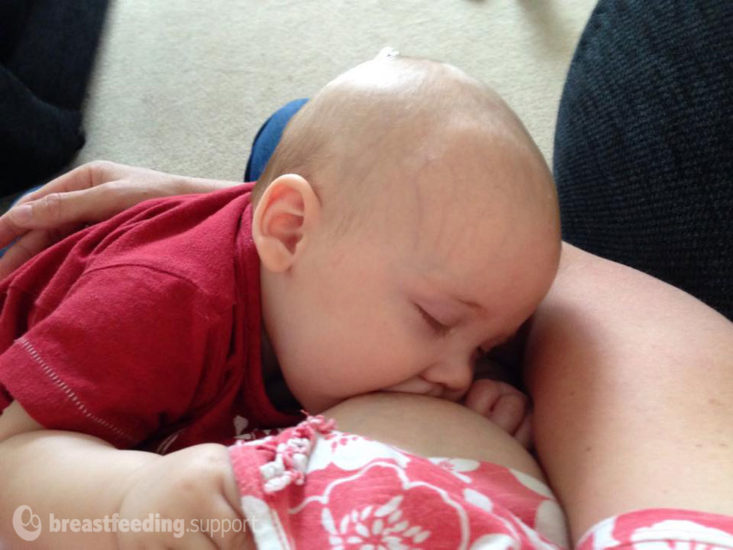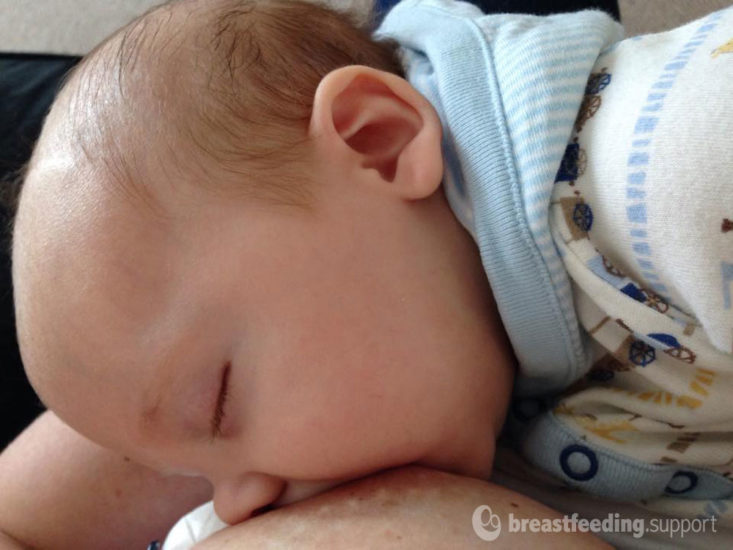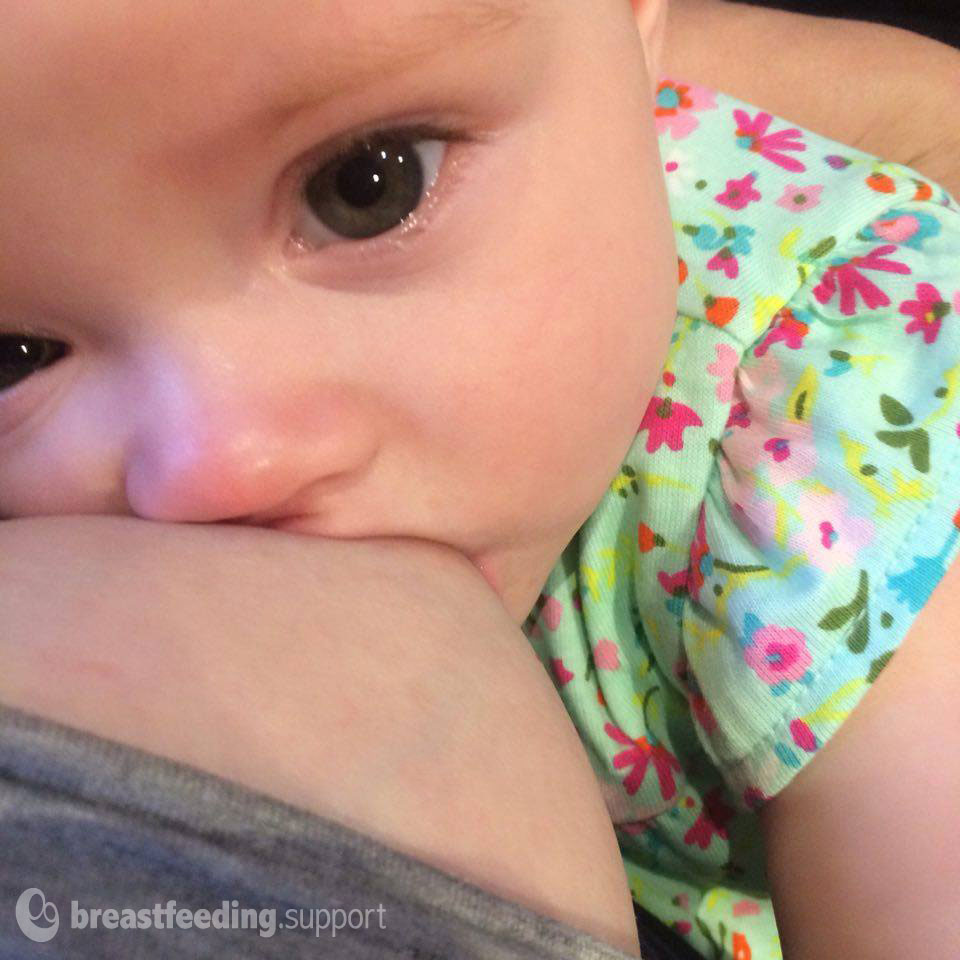Mothers are often told not to let their baby fall asleep breastfeeding in case it creates a bad habit which might be difficult to break in the future. Is nursing to sleep really a problem or is it the perfect mothering tool? This article looks at the pros and cons of breastfeeding your baby to sleep.
The advantages of breastfeeding to sleep
- Breastfeeding helps babies fall asleep quickly any time of the day or night due to the rhythmic action of sucking and the sleep inducing hormones in breast milk which help establish their circadian rhythms—their internal body clocks affecting sleeping and eating cycles 1.
- Nursing baby to sleep gives more opportunities for extra breast milk and hence more calories.
- Breastfeeding to sleep helps a baby’s emotional health by making him feel safe, secure, calm and content; perfect for his developing brain. It is the opposite of “crying it out” and has no negative effects.
- It’s a handy mothering tool to be able to settle baby to sleep any time or any place.
The disadvantages of breastfeeding to sleep
- It can be inconvenient if you have other things to do or other small siblings who need you. A sling can help, there is no reason why you have to sit quietly in a dark room while you are breastfeeding your baby to sleep. You can breastfeed in a ring sling or wrap while moving around the house or with a hand free for a remote control or phone. Breast and Bottle Feeding Safely in a Sling by Dr Rosie Knowles discusses how to use slings safely.
- Other carers can’t breastfeed your baby to sleep. This can be a worry if you have to leave your baby regularly. But your partner, child minder or grandparent will find their own ways to get your baby to sleep (see ideas below).
- All children eventually learn to fall asleep on their own, but some children will take longer than others. By gradually introducing new sleep associations you can help your baby find other ways to fall asleep to hasten the process if you want to (see below).
My health visitor advises against breastfeeding to sleep, why?
Some people seem to want babies to sleep alone and “self soothe” as soon as possible even though it is not developmentally appropriate 2 (but they don’t object to fully grown men or women sharing a bed with their partner despite being more than old enough to self soothe). Unfounded concerns tend to be:
Concerns that a child will be nursing to sleep forever (they won’t)
- A child might still enjoy breastfeeding to sleep for two or three years or longer because it would still be developmentally normal to breastfeed until then, but it definitely won’t be “forever”.
- It takes only a short time in your day to settle your child to sleep this way.
- Even if you can’t imagine wanting to breastfeed your child to sleep when he is older, you can worry about it later! Meanwhile there is no need to deny your newborn the pleasure of falling asleep at the breast.
Concerns that the child may never become independent (they will)
- Babies grow out of breastfeeding to sleep just as all other mammal babies do, and just as babies grow out of crawling or wearing nappies, they stop breastfeeding.
- Independence is learned from feeling safe and secure not from forcing a child to the next developmental stage before they are ready which can make them more anxious and clingy.
How children outgrow breastfeeding to sleep
All children eventually learn to fall asleep without a breastfeed, it starts slowly and surely with:
- Falling asleep on a parent’s or caregiver’s chest or in a sling
- Falling asleep in a pushchair
- Sleeping on a car ride
- Falling asleep under a play gym or in a cot on their own
- Falling asleep by sucking their thumb or fingers
If you wish to hasten this natural progression, introducing new sleep associations (ways to trigger falling asleep) can reduce a baby’s reliance on falling asleep with the breast in his mouth.

How to stop breastfeeding to sleep
- Try introducing new sleep associations or a new bed time routine. Replacing breastfeeding with a bath, warm drink, reading a story or rocking your baby to sleep takes more effort, and bed time may take longer that way than by breastfeeding, but it works for some families. The No-Cry Sleep Solution: Gentle Ways to Help Your Baby Sleep Through the Night offers ideas for introducing new sleep triggers.
- Detach baby before he is fast asleep. Once you’re sure the breastfeed is finished, try detaching your baby from the breast (break the suction with a finger in the corner of their mouth) before your baby is fast asleep. If baby immediately rouses up to feed again you could try a little finger pressure under their chin, rub your baby’s back or cuddle him so his cheek is against your naked breast, or sway gently to rock baby back to sleep. Gradually your little one will get used to staying asleep without the breast in his mouth. Bear in mind your baby may rouse up because he is still hungry and needs the second breast, in which case feed him and try again after he has finished the second side.
- Separate sleep surface. Some mothers find it is easier to manage nursing back to sleep if they are Co-sleeping With Baby. But conversely sometimes the closer a toddler sleeps to his mother the more he may seem to wake to breastfeed during the night—and need breastfeeding back to sleep again. Breastfeeding lying down on a separate mattress on the floor next to your bed may mean it is easier to move away after the feed without disturbing your sleeping child. You may be able to quickly settle your baby back to sleep in the night with a hand on their back without a breastfeed.
- Negotiate. Once a child is old enough to understand, you may be able to negotiate a different way to fall asleep.
- More ideas. Our article Baby Waking up at Night has lots of ideas to help—from introducing new sleep triggers to setting limits on nursing to sleep at night or night weaning.
There is no guarantee that stopping breastfeeding altogether will stop night waking. There are lots of reasons for a child to wake at night and without breastfeeding, you may find it takes a lot longer to get them back to sleep.
Summary
The notion that a baby shouldn’t breastfeed to sleep incase it is difficult to break the habit later fights biology and makes mothering harder. Breastfeeding and breastfeeding to sleep are developmentally normal activities designed to make baby care easier by calming both mother and baby and helping them sleep. You can encourage new ways to fall asleep as your baby grows, just as you give your baby opportunities to crawl and then walk. But there is no need to deprive your baby of something pleasurable due to worries he might find it difficult to fall asleep on his own in the future.


